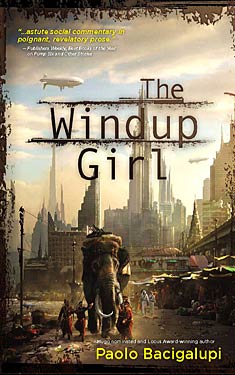 |
| Worlds Without End |
2010 Hugo Award Winner for Best Novel and 2009 Nebula Award Winner for Best Novel
I'm a sucker for a good setting. After all, I was raised up on a steady diet of The Lord of the Rings and learned early that a well built setting is a wonderful compliment to a good story, and can even be a pleasure all its own. When you come down to it, that's probably why I love science fiction and fantasy - they're the only genres were I can indulge in the pleasure of world building. Well, The Windup Girl is an absolutely fantastic bit of world building, and I'll waste no more time in giving it high praise.
Rather than being set on some far off planet or in a gritty metropolitan future, The Windup Girl takes place in a Thailand of the future, one that exists in a radically different, but utterly believable, political and economic world from our own. It's that believability that's so incredible about Bacigalupi's world. Our world has gone through many economic shifts, from agrarian to industrial and beyond. But who from an agrarian society could have pictured an industrial world? Of course, there's no guarantee the world will go the way of Bacigalupi's vision (hopefully it won't) but one can readily imagine it, and that makes it a wonder to behold.
Without giving too much away, since so much of the pleasure of The Windup Girl is the slow unraveling of its setting, the world Bacigalupi builds is one of a post-industrial crunch. Well before the time of the book, the petroleum that fuels our world's economy ran out, without any comparable alternative being found, and the global economy quickly became a thing of the past. The world couldn't just go back to being agrarian though, because industry had changed the world forever. Alternative technologies provide for some of what petroleum provided before, though with nowhere near the power, and the world is slowly inching back towards a global economy. Maintaining these technologies is crucial, because during the industrial age the agro-businesses had created genetically engineered crops and plagues that guaranteed humanity would need to continue to rely on advanced technology to keep itself alive and fed.
In the midst of this world of economic isolation and genetic disaster, the city of Bangcock is a boiler plate of political and economic tensions. Two major forces jostle for power within the city, as those who seek to protect the city from the outside world, the "White Shirts" of the environmental ministry, butt heads with those of the Trade Ministry who see salvation for Thailand in the recovering global economy. The Windup Girl is the story of one genetically engineered Japanese girl who becomes caught up in these forces.
This book certainly won't be for everyone, however. It is a story about politics, and so naturally it moves at a lumbering pace. Mind you, I enjoyed nearly every minute of it, but it was certainly not a page turner and took me awhile to finish. Also, the exploitation which the titular Windup Girl Emiko faces throughout the story is not easy stuff, so if you've got a queasy stomach you should probably stay away. It's also not a book without it's flaws. The prose is perfectly serviceable, but not incredible, and the characters that inhabit it, while not flat, fail to really jump off the page.
It's also not a book whose message I can get on board with, though that certainly doesn't mean its poorly done, or that I can't enjoy it. Without giving too much away, the books overall slant seems to be something of a Buddhist Transhumanism. Which, when you come right down to it, is a very interesting worldview, just one dramatically opposed to my own.
So, if you love world building, and enjoy political stories, I can highly recommend The Windup Girl. If that's not your style, then this book is definitely not for you.
Also, fantastic cover.